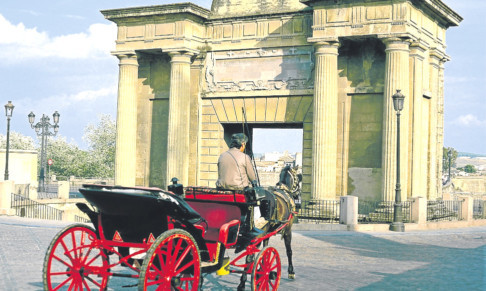
Spain may be in the grip of austerity, but it doesn’t seem to have hit the heart of the Andalucian city of Cordoba too hard.
It has an affluent feel and the streets are spotless. Around midnight on Friday, the street cleaning trucks made three circuits of the historic centre and on Saturday morning there wasn’t a scrap of rubbish to be seen. Beat that, Edinburgh.
In the courtyard of the Hotel El Conquistador (right outside my bedroom window) a wedding reception was in full swing and the cava was flowing. Outside Bar Santos, in the shadow of the medieval Mezquita, dozens of young Cordobans were laughing, chatting, snacking on tapas and swigging beer.
I found a promising-looking tapas joint Ordonez (Medina y Corella 3, tabernavinoteca.com) which is on a narrow side street a couple of minutes’ walk from the hotel, and settled down for an evening’s snacking. Daringly, I ordered the stuffed baby cuttlefish (chipirones rellenos). They looked like miniature haggis (if haggis had tentacles) and were definitely an acquired taste . . .
Next morning, I walked through the heart of the Juderia once the city’s Jewish quarter to the magnificent Alcazar de los Reyes Cristianos. Here, avenues of neatly trimmed cypress trees, courtyards scented with orange blossom, fountains and ponds stocked with languid koi carp surround a magnificent 14th Century fortified palace close to the banks of the Guadalquivir, Spain’s second-longest river.
It starts in the Sierra Nevada, many miles north of here, and finally meets the Atlantic near Cadiz, after flowing through the historic Andalucian cities of Cordoba, Seville and Jerez. Inside the castle, displays of Roman mosaics are a reminder that this is a very old city indeed. Breathtakingly steep spiral stairs lead to the top of the Alcazar’s highest tower. From here, there’s a fantastic view of the city and a free peek into the drill square of the Royal Stables next door, where white Andalucian horses are being put through their paces.
There are more horses waiting between the shafts of old-fashioned open carriages on Campo Santo de las Martires, opposite the Alcazar. On a summer day, a carriage tour is a cool, breezy and easy-going way to take in the high points of the old town without getting hot and footsore. This, I thought, as we trotted through cobbled streets lined with blindingly white houses, is the way to travel even if a 40-minute trip does cost €45. It works out cheaper, of course, if there are more of you the carriages seat up to five people.
Cordoba’s historic centre is, like the centre of every picturesque town in the world, predictably awash with shops selling typical local arts and crafts. This is one of the region’s flamenco capitals, and in the evening after watching the horses of the Caballerizas Reales de la Corredera and their sombrero-wearing riders putting on a breathtaking display I watched a dazzlingly flamboyant flamenco show at La Buleria (Calle Pedro Lopez 3, tel. 0957 483 839, €12 including one free drink).
Flamenco shows start late (about 10.30pm) so there was plenty of time for dinner beforehand at El Sotano, on Cordoba’s grandest square (Plaza de la Corredera 1, tel. 0957 941 099).
It’s essential to get there early to truly take in the architecture of Cordoba’s most splendid slice of heritage. La Mezquita, the 8th Century mosque built in Cordoba’s Moorish heyday, opens at 10am and by 10.30 it’s already starting to fill up with visitors.
Converted into a great cathedral after the Spanish reconquest, it’s an echoing space of marble halls and arches where niches inlaid with glittering mosaics and Islamic scripts stand next to Christian sepulchres (catedraldecordoba.es, €8).
After the sightseeing, it was time to join locals at one of Cordoba’s longest established restaurants, Casa El Pisto (casaelpisto.com), for a glass of mantilla Cordoba’s version of sherry and some more authentic Andalucian dishes.
Looking at the menu ‘pork hands’ and ‘bull’s tail’ didn’t appeal, somehow, but the prawns in spicy piri-piri sauce hit the spot.
Tourist office: cordobaturismo.esKirker Holidays (tel. 020 7593 2283, kirkerholidays.com) has three nights B&B at El Conquistador from £599 per person including rail transfers, the services of a Kirker Concierge to book local guides or a table for dinner, and flights from Edinburgh with Jet2 (jet2.com). Price includes pre-allocated seating and 22kg baggage allowance. The easiest way to get to Cordoba from Malaga is by rail; a four day Spain InterRail pass costs £185 from Rail Europe (raileurope.co.uk, tel. 0844 848 4070).

Enjoy the convenience of having The Sunday Post delivered as a digital ePaper straight to your smartphone, tablet or computer.
Subscribe for only £5.49 a month and enjoy all the benefits of the printed paper as a digital replica.
Subscribe